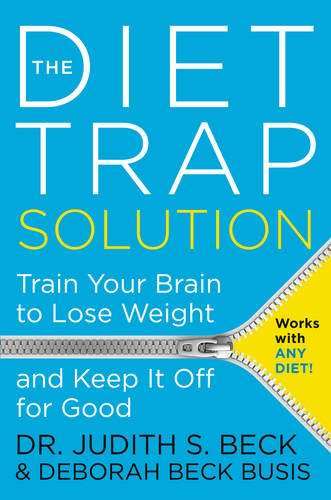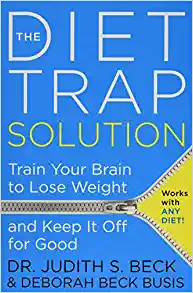The Diet Trap Solution by Judith S. Beck, Ph.D., Deborah Beck Busis
Dieting can be difficult—if it were easy, two-thirds of Americans wouldn’t be overweight. To successfully lose weight (and not gain it back!), dieters need to learn two sets of skills: how to identify the traps that get them off track and what strategies they can use to overcome them. The following are common diet traps that most dieters fall into.
1. Psychological Traps
From time to time, virtually every dieter struggles with feelings of deprivation, disappointment and discouragement. They may feel burdened by dieting or they may feel unmotivated. They may be plagued with sabotaging thoughts such as “I don’t care. I’m going to eat [this unplanned food] anyway.” Dieters need to learn how to motivate themselves every day and how to keep their eye on their ultimate goal. They also need to recognize that either they will be deprived of some food they want right at a given moment or they’ll be deprived of the important benefits of weight loss (better health, better appearance, better self-confidence, etc.) [giveaway giveaway_id=2051 side=”right”]
2. Emotional Eating Traps
Dieters get trapped by emotional eating when they think that if they’re upset, food is the only thing that will make them feel better, or if they think that if they’re upset, they’re entitled to turn to food to make them feel better. Of course they’re entitled to feel better but very shortly after they eat something they shouldn’t, they invariably feel worse. Dieters who fall into this trap need to learn what to do when they’re upset so they don’t turn to eating.
3. Travel and Eating Out Traps
Dieters get trapped by travel and eating out when they have trouble controlling their eating away from home. They often think of these situations as “special” and therefore they should be able to eat whatever they want. Dieters who fall into this trap fool themselves into thinking that eating off plan in these situations won’t lead to weight gain. They need to develop a special plan that doesn’t include eating everything they might want but does allow them to eat a certain amount extra.
4. Food Pusher Traps
Dieters get trapped by food pushers when they think that what other people want them to eat is more important than what they have planned to eat. They often think that they can’t disappoint others by turning down food or they think it’s their responsibility to make their eating companions feel okay about their own over-indulgences. Dieters who fall into this trap sometimes have to learn how to be nicely assertive and how to put themselves and their own health first.
5. Getting Off Track Traps
Dieters get trapped by getting off track when they eat something they weren’t supposed to and have a sabotaging thought such as, “I’ve blown it for the day and I might as well eat whatever I want and start again tomorrow.” They often fool themselves into thinking that making one dieting mistake is a valid reason to keep making more. Dieters who fall into this trap need to recognize that it makes no sense to compound one mistake with another and learn strategies to get back on track the moment they realize they’ve faltered.
6. Stress Traps
Dieters get trapped by stress when their lives get busy and they don’t make dieting a top priority. They often think that having to work on healthy eating will make them more stressed. Dieters who fall into this trap don’t realize that being in control of their eating will help them feel more in control in general and that they will feel more stressed if their weight goes up. They need to learn specific techniques to reduce their overall stress so they’ll have sufficient time and energy to devote to their important goal of losing weight.
7. Holiday Traps
Dieters get trapped by holidays when they use them as an excuse to overeat. Their sabotaging thoughts are usually like this: “It’s a holiday. It’s okay to indulge.” ”Everyone is eating whatever they want;” I should be able to also.” “I can’t have a good time unless I can eat and drink freely.” In addition, they often get busier during holidays and don’t take the time for planning healthy eating and exercise. They need to remind themselves that gaining weight during the holidays never feels good once the holiday is over and they need to learn how to plan limited special indulgences without going overboard.
Judith S. Beck, Ph.D. is the President of the Beck Institute for Cognitive Behavior Therapy and the clinical associate professor of psychology in psychiatry at the University of Pennsylvania. Deborah Beck Busis, LCSW, is Beck Institute’s Diet Program Coordinator. She helped Dr. Beck develop the diet program and works with her on a variety of different projects at the Beck Institute, including conducting research. She is the New York Times bestselling author of The Beck Diet Solution. Click here to learn more about Judith and her latest book co-authored with Deborah Beck Busis, LCSW also of the Beck Institute.  Click HERE o learn more about The Diet Trap Solution where Dr. Beck explains that when it comes to losing weight, it’s not just about what we eat. It’s also about how we think. To consistently eat differently, we must learn to think differently. Diets fail us because they don’t offer effective strategies for overcoming the common traps—emotional eating, social pressure, dining out—that can derail us. Now, she and her daughter, Deborah Beck Busis, share the techniques they have successfully used with thousands of clients, revealing how to overcome the thoughts and behaviors that have held us back. With The Diet Trap Solution, readers on any diet regimen can learn to identify their specific diet traps and create action plans to strengthen their “resistance muscle”—making losing weight easy, sustainable, and enjoyable.
Click HERE o learn more about The Diet Trap Solution where Dr. Beck explains that when it comes to losing weight, it’s not just about what we eat. It’s also about how we think. To consistently eat differently, we must learn to think differently. Diets fail us because they don’t offer effective strategies for overcoming the common traps—emotional eating, social pressure, dining out—that can derail us. Now, she and her daughter, Deborah Beck Busis, share the techniques they have successfully used with thousands of clients, revealing how to overcome the thoughts and behaviors that have held us back. With The Diet Trap Solution, readers on any diet regimen can learn to identify their specific diet traps and create action plans to strengthen their “resistance muscle”—making losing weight easy, sustainable, and enjoyable.
Buy this Book!
Amazon




